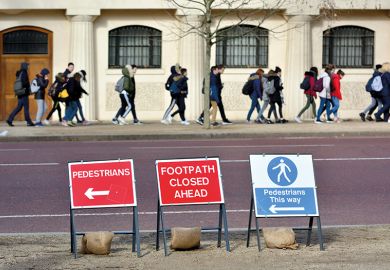The Westminster government will make graduates repay more of their loans to build a “more sustainable” student finance system in England, but there are warnings that the highest-earning graduates will be the ones to benefit from the changes, with most others worse off.
The package of student finance changes unveiled on 24 February will see the loan repayment threshold lowered to £25,000 from just over £27,000 for new borrowers starting courses from September 2023, the repayment term extended to 40 years from 30 years, and interest rates lowered so loan balances increase only with the retail price index of inflation.
The government also announced that tuition fees would be frozen at £9,250 for a further two years – up to and including 2024-25 – delivering a blow to universities on funding with what will be a freeze of at least seven years in total.
The changes were announced as part of the government’s wider response to the Augar review of post-18 education.
The government will also be publishing on 24 February a consultation on proposals for student number controls and minimum entry requirements to qualify for student loans – although the higher education minister, Michelle Donelan, has sought to downplay the impact of the latter – and on the lifelong learning entitlement (LLE).
The student finance changes would create a “fairer, and more sustainable, student finance system which will keep higher education accessible and accountable”, said Nadhim Zahawi, the education secretary. “These changes will create a fairer system for both students and the taxpayer.”
However, Labour’s shadow education secretary, Bridget Phillipson, called the move “another stealth tax for new graduates starting out on their working lives, which will hit those on low incomes hardest”.
Gavan Conlon, a partner at London Economics, who has previously compiled analysis reports on higher education policy for the government, said: “The graduates who will benefit the most from these policies are the highest earning – predominantly male – graduates. Most other graduates will be worse off.”
Dr Conlon estimated that the government would recoup approximately £540 million per cohort of graduates as a result of the student finance changes.
He added: “Under the current system, only the highest-earning graduates clear their loans, and the real interest rate means that they remain in the system and continue to make repayments, ultimately paying more and subsidising lower earners. Cutting the real interest rate to zero means these high earners will pay less. In contrast, with the increase in the repayment period to 40 years, middle-income graduates will continue to repay for even more of their working lives.”
But according to a Department for Education briefing document: “Without action, only 23 per cent of borrowers who enter full-time higher education next year are forecast to repay their loans in full, with the rest picked up by the taxpayer. This has to change – and our reforms will mean 52 per cent of borrowers will repay their loans in full.
“Taxpayers – most of whom have not been to university themselves – are funding 44p of every pound of student loans issued to full-time undergraduates. In future, taxpayers will fund less than 20 pence in the pound of the new loans issued each year, and more than half of students will repay their loan in full.”
On student number controls, the DfE said it would be “consulting on the broad principle of controlling student numbers in order to constrain growth in provision that does not lead to good outcomes for students and to tilt growth towards provision with the best outcomes, and in high priority subject areas which are important to the economy”.
On the lifelong learning entitlement – which will “support students to study, train, retrain or upskill at any stage throughout their lives through flexible and modular courses” – the department said it would be “seeking views on our ambition, objectives and coverage, together with aspects such as modularity, maintenance, flexibility and quality”. Universities, while supporting the LLE, may have concerns about any government intent to use it to divert students away from degrees.
The DfE also said ministers would be announcing “almost £900 million of new investment in our fantastic HE system over the next three years”, including “£300 million of recurrent funding and a total of £450 million in capital funding over the next three years to support high quality teaching and new state of the art facilities, which we will ask the Office for Students (OfS) to distribute through the Strategic Priorities Grant (SPG).
“This funding will be used to drive up provision that the nation needs, including science and engineering courses, courses to support the NHS, and shorter degree alternatives focused on developing the right skills for our dynamic economy.”
And the DfE said it would be “investing up to £75 million to deliver a national state scholarship, which will support high-achieving students across higher education, further education and apprenticeships who may not otherwise have the means to access opportunities to pursue their chosen path”. Options for design might include “targeting students by reference to a range of criteria, such as household income and achieving certain grades at A level”.
Labour’s Ms Phillipson said of the minimum entry requirements proposal: “Instead of focusing on supporting more students to succeed at school or widening access to university, the government is slamming the door on opportunity.
“Parents and grandparents across this country are incredibly proud of their children who are working hard for degrees that the government is now rubbishing. That is insulting.”
Alistair Jarvis, the chief executive of Universities UK, said: “The country needs its universities and graduates to be at the forefront of post-Covid economic recovery, supporting the NHS and creating good jobs in local communities. Now is not the time to shrink or underfund universities, nor place a cap on aspiration by restricting the number of places for people to study at university.”
He added: “The uplift in grant funding is a positive; however, the tuition fees freeze for another three years leaves universities under even greater pressure to do more with less.”
Tim Bradshaw, the Russell Group chief executive, said that while new investment was “very welcome”, freezing tuition fees “inevitably reduces their value over time, so this will add to the financial pressure on universities to adapt while maintaining quality and choice for students”.
Gordon McKenzie, the GuildHE chief executive, welcomed the prospect of further LLE progress but expressed concern about minimum entry requirement plans. Pupils with special educational needs “are far less likely to achieve grade 4 GCSE in English and maths but [they] can and do succeed on a range of higher education courses that suit them”, he said.
“Similarly, we worry about the idea of ministers using student number controls to promote certain courses at the expense of others, by trying to predict what will happen to the economy and labour market for decades ahead.”
Diana Beech, chief executive of London Higher and a former policy adviser to Conservative universities ministers, said: “Despite only setting out potential directions of travel, it is nevertheless concerning to see minimum eligibility requirements being tabled as the key to unlocking future access to student loans.
“Data from London show that this would have disastrous implications on students from London’s most disadvantaged communities, locking out almost half (49.4 per cent) of free-school-meal-eligible learners in outer London who do not achieve a grade 9-4 pass in English and maths GCSE, 40.1 per cent of black pupils and 86.1 per cent of SEN pupils.”
Dr Beech also said the sector was “already unnecessarily stretched responding to multiple Office for Students’ consultations on future regulation. In the interests of properly considered responses, we appeal to government to stop this carpet-bombing of consultations.”
Register to continue
Why register?
- Registration is free and only takes a moment
- Once registered, you can read 3 articles a month
- Sign up for our newsletter
Subscribe
Or subscribe for unlimited access to:
- Unlimited access to news, views, insights & reviews
- Digital editions
- Digital access to THE’s university and college rankings analysis
Already registered or a current subscriber?








